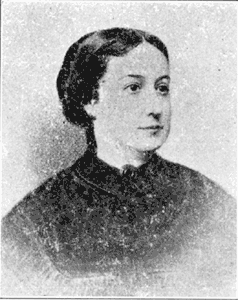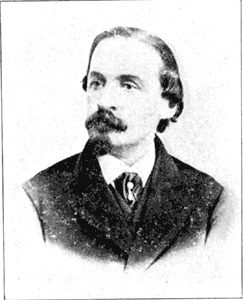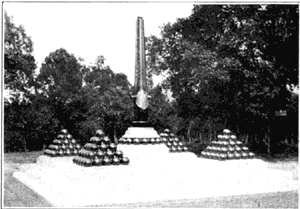| Home -> James H. Barry Press -> The Great Diamond Hoax - Chapter VII | |||
|
Chapter VII.
The Great Battle of Shiloh and the South's Irreparable Loss In the Death of General Johnston. War, fifty years ago, was bad enough, but it wasn't the plain, cold-blooded deviltry that it is today. When men met face to face and leaders led, in fact as well as theory, I can understand the inspiration, the enthusiasm, the wild love of glory, that invited the best blood to a military life. But now, when victories are to be won by pressing buttons, switching on or off electric currents or dropping bombs from the sky on the heads of helpless women and children, while it may attract those of a mechanical turn of mind, it has ceased to be a business that should interest a gentleman. My recollection is of the old fighting days. I paid that when I arrived in Corinth on April 4, 1862, not more than five thousand men were assembled there. But all that night and the next day troop trains were unloading enormous reinforcements and some were arriving by forced marches on foot. By the night of April 5, between twenty-five and thirty thousand soldiers were in camp, the flower of the fighting army of the South. General Albert Sidney Johnston, with his heroic figure and magnetic presence, roused the men to a height of martial exultation very hard to describe. Everyone knew that a great battle was impending. Most of them guessed that the morrow would be the day. But they hardly seemed able to wait. They were like war dogs tugging at the leash, confident in themselves, confident in their cause. One would have thought they were bound for a holiday excursion instead of a death grapple from which many would never emerge. Very much to my disappointment, I was assigned to the staff of General Beauregard, second in command. I had hoped to be with General Johnston, where the fighting would be the fiercest. Nevertheless, I had enough. The troops retired at an early hour on the night of April 5. But in the darkness flitted shadows of alert men, making busy preparations for a great event. At two o'clock in the morning, the troops were roused from their sleep, had hasty refreshment in the darkness, and then fell in, company after company, like so much clock work, and the march to Pittsburg Landing, or Shiloh, nine miles away, began. The infantry was well in front, separated by perhaps half a mile from the artillery and more noisy equipment. The nature of the country was admirable for a secret movement. It was well wooded, with abundant cover to screen our presence, and it seemed almost uncanny how the thousands of men marched forward with scarce noise enough to stir the early morning air. Not a word was spoken. It was just daylight when we drove in the Federal pickets. Before us lay the army of General Grant. It seems to me that it was not more than two hundred yards away. Breakfast was being cooked, the officers and men totally off their guard. Nothing in the nature of surprise could be imagined more terrible and complete. Quick commands were given, there was a rattle of musketry, the "rebel" yell rang out - a sound that might well start the resurrection of the dead - and the next instant I saw what appeared a long line of racing apparitions in gray, with fixed bayonets, clear the intervening space and fall like a cloudburst on the men in blue. Nothing saved the army of General Grant from utter destruction but the presence of several gunboats in the Tennessee river. These were splendidly handled, and the fire was deadly and precise. It gave the Union forces an opportunity to recover somewhat and put up a gallant fight. Field artillery was concentrated on the gunboats. Sharpshooters climbed into nearby trees and picked, off the gunners at their posts. The fire became less frequent, less precise. Anyone could see the line of General Johnston's strategy. Grant's army was encamped on rising ground beyond the Tennessee. Behind it the ground fell off rather abruptly to a narrow plain along the river bank, beyond which was no retreat. The object of the attack was to force the Federal line to the river bank and then drive in the wings until the Union army became a huddled mass on the low ground where it could not fight effectively, and be at the mercy of artillery fire. Then it must either surrender or be wiped out. The first step was accomplished by the initial bayonet charge. The second required more time. The battle raged into the afternoon. The field was covered with dead and dying, but the strategy of General Johnston was rapidly bearing fruit. The gunboats were almost silenced, the Federal columns showed apparent signs of disintegration. Another hour would have seen a total rout. General Johnston had been everywhere, the directing genius, exposing himself to needless dangers. Just in the moment of triumph, he fell headlong from his horse. It seemed as if the news of this irreparable loss spread through the army like wildfire and caused, not a demoralization, but a general pause. Beauregard took command, evidently under a great mental strain. To the surprise of many, he gave orders to retire. I heard him say: "Tomorrow we will be across the Tennessee river, or in hell." He had another guess. Early the next morning General Buell crossed the Tennessee with thirty-five thousand fresh troops, and all day we were fighting our way back to the strong position at Corinth. The great opportunity was lost. Thus I saw the bloodiest battle of the war and I think the most decisive - far more so than Gettysburg. Had Johnston overwhelmed Grant at Shiloh, met Buell with an army flushed with victory, with no gunboats to contend with, there might have been another tale to tell. With Tennessee liberated, Kentucky and Missouri might have joined the Confederate cause and influenced the final outcome profoundly. When I look back at the long series of mishaps and unforeseen misfortunes that seemed to haunt the Lost Cause, I cannot but conclude that God's will was there. After many years of bitter recollections, we are all of one mind - that the outcome was best for the country, and best of all for the South. I saw General Johnston's body on the field, where he fell. The wound that caused his death was of a trifling nature. A rifle ball had cut an artery in his leg. A surgeon with a tourniquet could have stopped the hemorrhage. But he never sought assistance. He stood by his post like a true soldier, and slowly bled to death. History has classed Johnston as a great military genius. Years after, the Government of the United States erected a shaft with a suitable inscription on the spot where he fell at Shiloh. His tomb, with a noble equestrian statue, is in New Orleans. Most of his direct descendants live in California, the State that he saved from the desolation of war. Concerning the battle of Shiloh, I have better testimony than my own. A score of years later, I met General Grant in New York. Out of an acquaintance, an intimate friendship developed. During his first financial embarrassment, of which the world never knew, I piloted him to a safe haven. Grant's genius was entirely one-sided. In matters of business, he was the veriest child. He had tied himself up in Wall Street ventures and was facing ruin when he sought my advice. I took his account to my brokers, Henry Clews & Company, where I had a balance of nearly two millions to my credit, and, by careful nursing, brought him out, not only even, but ahead. The General and I often spoke of Shiloh, and he admitted, with a soldier's frankness, that only Johnston's death saved his command. He also added that he learned a lesson in war that fateful day, the most important in his long experience. In this era of good-will and reconciliation, when the old boys in blue and gray are meeting in comradeship on the scenes of their former struggle, why cannot someone write a trustworthy and impartial history of the great drama - the greatest of our national life - which our boys and girls may read and learn the truth? The text-books of our schools are still deformed by a spirit of intolerance and prejudice, most unfortunate and misleading in an age that has happily outlived the bitterness that divided us in the past. |
|||
 Mrs. Chas. S. Fairfax Wife of Lord Fairfax, niece of John C. Calhoun [Reproduced from an old photograph.] |
|||
 Charles. S. Fairfax Last Lord Fairfax in direct male descent [Reproduced from an old photograph.] |
|||
 U. S. monument and marker on battlefield of Shiloh, indicating spot where General Johnston fell. |
|||